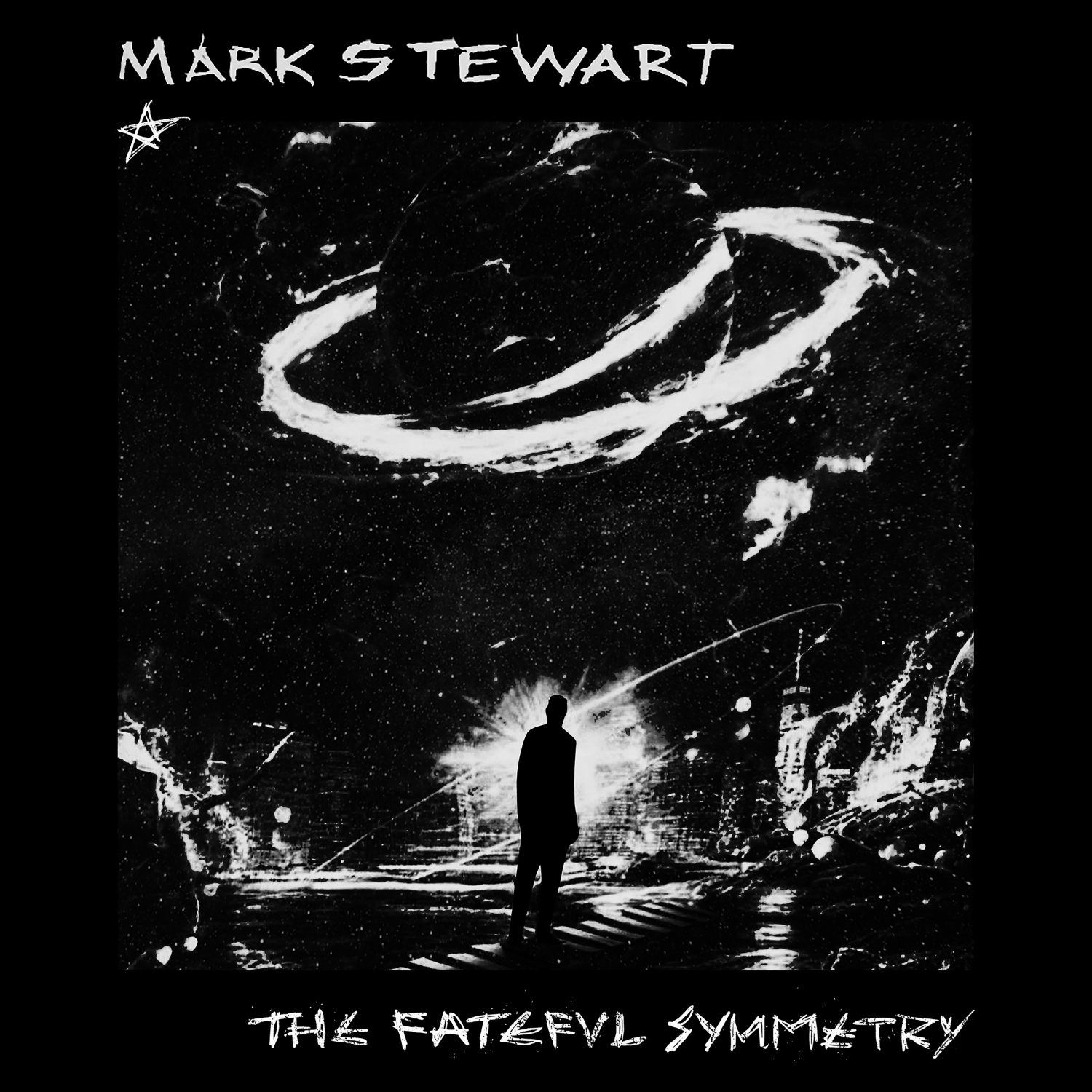Mark Stewart – The Fateful Symmetry (Mute)
 The posthumous studio album by the late Pop Group vocalist is finally unveiled after his tragic passing in 2023. It shows a side to the musician that has not been heard before; an intimate portrayal of his thoughts and emotions away from the more political music of his previous albums, but nonetheless maintaining an air of rebellion.
The posthumous studio album by the late Pop Group vocalist is finally unveiled after his tragic passing in 2023. It shows a side to the musician that has not been heard before; an intimate portrayal of his thoughts and emotions away from the more political music of his previous albums, but nonetheless maintaining an air of rebellion.
It opens on the heavy, boxiness of single, ‘Memory of You’; a dark electro song that rivals Peter Murphy’s recent solo album. The choral symphony of noir track, ‘Neon Girl’, inspired by the “singalong” chorus’ of iconic French singer George Brassens and the “cinematic staging” of the classic film ‘The 39 Steps’ and featuring the backing vocals of the Raincoats’ Gina Birch with whom they share producer Youth (who has previously produced Stewart’s solo work). Uplifting the darkess, the spoken word introduction of hope in the chaos is realised in the piano drops of pathetic fallacy ‘This is the Rain’.
Stewart’s key interest in reggae music is seen in ‘Everybody’s Got to Learn Sometime’, before returning back to the dark eletro-beats and gothic wail of ‘Twilight’s Child’; a sinister song that holds an ominous foretelling. An industrial sound enters the album with Stewart’s 21st century analysis in ‘Crypto Religion’; its futuristic, robotic vocals are reminiscent of Front Line Assembly’s sound, with the distinct sound of Harmonia also filling the next guitar driven track, ‘Blank Town’; a possible criticism of this album is that borrows too heavily from other artists at this point. The release ends on the piano waltz of ‘A Long Road’; a poignant piece that radiates the eternal light of this talented artist. RIP Mark Stewart.
‘The Fateful Symmetry’ is available now on vinyl, CD and digitally.
© Ayisha Khan.
© Ayisha Khan.
Gina Birch – Trouble (Third Man)
 The former Raincoats’ bass player releases her second solo studio album following the success of her debut ‘I Play My Bass Loud’ in 2023. The album cover is again her own artwork but starkly contrasts the previous release’s sleeve with the image of a woman being raped, showing Birch’s unapologetic feminist shock factor is still rawly on display. The contents of this album focus again on feminist themes but also her own personal experiences.
The former Raincoats’ bass player releases her second solo studio album following the success of her debut ‘I Play My Bass Loud’ in 2023. The album cover is again her own artwork but starkly contrasts the previous release’s sleeve with the image of a woman being raped, showing Birch’s unapologetic feminist shock factor is still rawly on display. The contents of this album focus again on feminist themes but also her own personal experiences.
Birch muses at the idea of her own mortality following the knowledge that she’s getting older, with ‘I Thought I’d Live Forever’; it echoes the urban creep of her last release with choral melody. The delicate Raincoats vocal sounding ‘Happiness’ is filled with ’60s psychedelic sitar; a song about escapism based on Birch’s seeing a restaurant sign while visiting her mother and a chill pill before the album single and next single, ‘Causing Trouble’ – a punchy, drum bracketed reminder that no well behaved women ever changed history, complete with Birch and her band reading out the names of feminist women who have made their impression on smashing patriarchal rules.
Her intertwining between painting and music is achieved in the aptly named ‘Cello Song’ with its thick, robust strokes acting as a homophone for the brush strokes of the painting she’s describing. The best track on the record is her other single, ‘Doom Monger’: is apocalyptic foreboding is complimented by a simple nihilistic reggae trudge but still infuses with a scent of hope despite the futile situation that faces the planet. The electronic track ‘Nothing Will Ever Change That’ has an infectious groove whilst ‘Sleep’ is a relatable girly song about obsessive love demonstrating Birch’s reliance on vocals rather than overbearing instrumentals, also seen in final track ‘Train Platform’; a spoken word piece that has an ominous predatory tone to it.
‘Trouble’ is available now on coloured vinyl, vinyl, CD and digitally.
© Ayisha Khan.
© Ayisha Khan.
© Ayisha Khan.
Gary Numan – A Perfect Circle: Live (BMG)
 Commemorating the musician’s triumphant return to Wembley Arena for the first time since 1981, this live release contains the entire setlist from the London date of his 2022 ‘Intruder’ album tour, including live footage of the entire show released as a DVD film with the CD format. Featuring a massive 24-track setlist, it feels more like a span of his career summarising his greatest outputs as “a perfect circle”, with special guest performances throughout. The album is formatted on a beautiful black and white photographed 3LP aside to the CD/DVD version.
Commemorating the musician’s triumphant return to Wembley Arena for the first time since 1981, this live release contains the entire setlist from the London date of his 2022 ‘Intruder’ album tour, including live footage of the entire show released as a DVD film with the CD format. Featuring a massive 24-track setlist, it feels more like a span of his career summarising his greatest outputs as “a perfect circle”, with special guest performances throughout. The album is formatted on a beautiful black and white photographed 3LP aside to the CD/DVD version.
Gary Numan’s set opens on the title track from his last studio album, ‘Intruder’, with its humming synths against tribal clatter. It jumps between discography periods from 2006’s ‘Jagged’ to his early Tubeway Army years with the synthy squelch of ‘Metal’ from 1979’s ‘The Pleasure Principle’, an album that he recently toured for its 45th anniversary. Numan’s first guest Gazelle Twin then arrives onstage for Middle Eastern backing vocals in ‘Intruder’s ‘The Gift’, portrayed emotively in the DVD footage.
The precision of the band’s rhythm section is brought out even further by the louder bass and drums in the released version as heard in ‘Films’ and ‘M.E’ (the latter with Tubeway Army bandmates Rrussell Bell on guitar and keyboardist Chris Payne on viola); the diversity of the track-list also includes the instrumental ‘Resurrection’ alongside all the timeless favourites and No. 1s such as ‘Down in the Park’, ‘Cars’ and ‘Are ‘Friends’ Electric?’. Fitting alongside in equal splendour are more of his newer songs, the highlight amongst being ‘Is This World Not Enough’ and the classical piano keyed autobiographical ‘A Black Sun’; showcasing some of the most forward thinking songwriting of any artist of his time. Numan was joined on stage with these for backing vocals by his own daughters Raven and Persia, showing the Numan legacy is very much family affair. Numan extended family member, Tim Muddiman, also accompanied the band onstage on guitar for ‘Me, I Disconnect From You’.
This musician is constantly releasing between his studio albums and this new live release – a long time in the making – like all his non-studio material, as a whole package presents a holistic experience of the listener; a three-dimensional documentation as one of the most successful and ingenuitive artists of a generation. The only possible criticism is that it sounds too perfect, with only Numan’s talk between songs and the crowd noise giving away that this is actually a live experience. It’s really that perfect.
‘A Perfect Circle: Live’ is available now on vinyl, CD/DVD and digitally.
© Ayisha Khan.